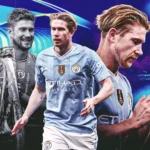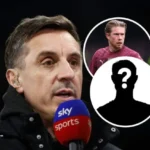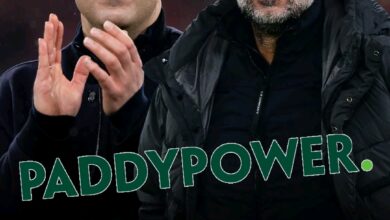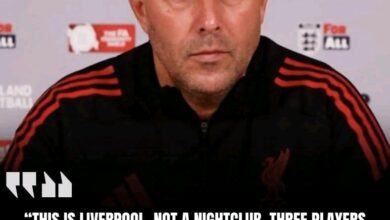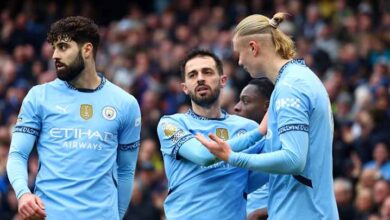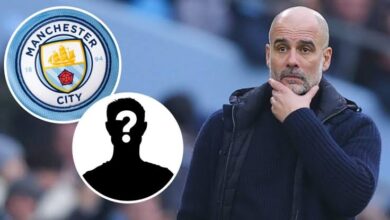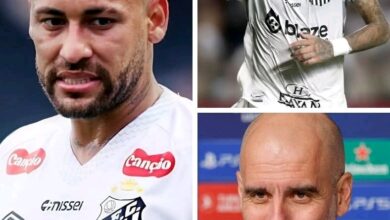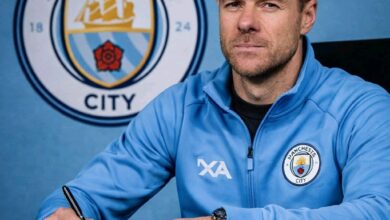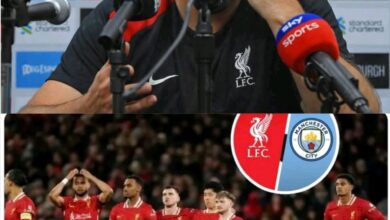‘It’s So Difficult’: Pep Guardiola Finds It ‘Impossible’ To Bid Farewell To Kevin De Bruyne

In the storied corridors of the Etihad Stadium, where champions have been crowned and legends born, a chapter is closing that even the usually composed Pep Guardiola struggles to discuss without emotion. Kevin De Bruyne, Manchester City’s maestro for the past decade, will bid farewell to the Sky Blues when his contract expires at the season’s end. This departure marks not just the end of a player’s tenure at a club, but the conclusion of one of the most transformative partnerships in Premier League history.
“I have lived a lot of things with them, a lot, good moments and terrible, bad moments,” Guardiola reflected, his voice tinged with the weight of memories accumulated over nine years of tactical innovations and trophy celebrations. The Spanish tactician, known for his meticulous approach to team building, faces what he admits is “one of the most difficult moments” of his Manchester City reign.
The 33-year-old Belgian midfielder recently revealed his disappointment at not being offered an extension to continue his remarkable journey with City. It was a revelation that sent shockwaves through the footballing world, particularly given De Bruyne’s status as the creative heartbeat of Guardiola’s dynasty. Yet, the decision appears to stem from pragmatic considerations regarding the player’s physical condition, with recurring injuries significantly hampering his availability over the past two seasons.
The Evolution of Manchester City
De Bruyne’s departure represents more than the loss of a single player—it symbolizes the ongoing evolution of a club that has systematically redefined success in English football. He joins an illustrious list of City stalwarts who have moved on in recent years: Yaya Toure, whose midfield dominance laid the foundation for City’s rise; Sergio Aguero, whose last-gasp heroics delivered the club’s first Premier League title; Fernandinho, the unsung defensive anchor; David Silva, the silky Spanish conductor; and Vincent Kompany, the talismanic captain whose leadership qualities transcended the pitch.
Each departure marked a turning point, a moment when observers questioned whether City could maintain their standards without these pivotal figures. Yet each time, Guardiola has orchestrated a reinvention, seamlessly integrating new talents while preserving the club’s identity. The question now looms larger than ever: how does one replace the irreplaceable? For in De Bruyne, City loses not just statistics and accolades, but a footballing intellect that has repeatedly unlocked the most stubborn defenses with a single, defense-splitting pass.
“There are a lot of players that come in and after they leave, they are part of my life,” Guardiola continued, highlighting the personal dimension of these professional transitions. “It’s impossible not to feel it. Of course, it’s so difficult. The feelings that he (Kevin) has, I understand completely. It cannot be otherwise. I wish personally for him and his family all the best.”
A Legacy Written in Silverware
De Bruyne’s legacy at Manchester City is etched in the trophy cabinet that has swelled considerably during his tenure. With sixteen major honors, including six Premier League titles and the coveted Champions League, he stands as one of the most decorated players in the club’s history. His vision, technique, and leadership have been instrumental in transforming City from ambitious challengers to perennial favorites, establishing a period of dominance that rivals any in the modern era of English football.
The Belgian’s influence extends beyond mere statistics, though his numbers—98 goals and 166 assists in 382 appearances—speak volumes about his impact. It’s the manner of his contributions that has left an indelible mark: the pinpoint crosses that defy physics, the thunderous strikes from distance that leave goalkeepers rooted, and the innate ability to elevate the performances of those around him.
Even as his time at City draws to a close, De Bruyne remains focused on adding to this impressive collection. The FA Cup semi-final against Nottingham Forest at Wembley represents an opportunity to advance toward a third triumph in this historic competition, potentially adding another chapter to his storied City career before the final page is turned.
“That would be good, of course it would be,” Guardiola acknowledged when asked about the possibility of De Bruyne departing with additional silverware. “He’s behaved unbelievably all these years and, this month, again, since he announced that he’s in the last months here in Manchester City. It will happen until the end.”
The Physical Toll of Excellence
The decision not to extend De Bruyne’s contract appears inextricably linked to concerns about his physical durability. The last two years have witnessed a troubling pattern of injuries that have significantly reduced his playing time and, at times, his effectiveness upon return. These setbacks have been particularly frustrating given De Bruyne’s relentless competitive spirit and his pivotal role in City’s tactical framework.
Medical staff at the Etihad have worked tirelessly to manage these issues, employing cutting-edge rehabilitation techniques and carefully monitored training programs. Yet the demands of modern football—with its congested fixture lists and increasing physical intensity—have taken their toll on a player who has consistently operated at the highest level for over a decade.
The grueling nature of Premier League football, combined with Champions League campaigns and international duty with Belgium, creates a punishing schedule that few bodies can withstand indefinitely. De Bruyne’s injury struggles serve as a stark reminder of the physical sacrifices required to maintain excellence at the elite level, particularly for players whose game relies heavily on explosive bursts of acceleration and dynamic changes of direction.
In this context, the decision not to offer a new contract, while emotionally difficult, aligns with the pragmatic approach that has characterized City’s recruitment and retention strategies under Guardiola and the club’s hierarchy. It represents a forward-thinking mentality that prioritizes sustainable success over sentiment, however painful the immediate consequences might be.
The Impact on the Dressing Room
Beyond the tactical void that De Bruyne’s departure will create, Guardiola must also navigate the psychological impact on a squad that has grown accustomed to the Belgian’s presence. In a dressing room filled with international stars and multiple trophy winners, De Bruyne has emerged as a standard-bearer, someone whose professionalism and dedication set the tone for collective achievement.
His leadership style—leading by example rather than through vocal exhortations—has complemented Guardiola’s meticulous approach, providing a bridge between the manager’s tactical instructions and their on-field execution. Teammates frequently reference De Bruyne’s football intelligence and his ability to interpret and implement Guardiola’s complex positional play concepts as a crucial factor in City’s sustained success.
The challenge for Guardiola extends beyond replacing De Bruyne’s statistical contributions; it involves nurturing new leadership dynamics and preserving the winning culture that has been carefully cultivated over nearly a decade. The manager’s track record suggests he is well-equipped for this task, having successfully managed similar transitions following the departures of other club legends.
What’s Next for De Bruyne?
As speculation intensifies about De Bruyne’s next destination, the midfielder remains characteristically focused on his immediate responsibilities. “He’s trained really good. He’s playing and helping us with his skills and his talents. I know he wants the best for the club,” Guardiola observed, highlighting the professionalism that has defined De Bruyne’s approach throughout his career.
Various reports have linked the Belgian with moves to Saudi Arabia’s burgeoning Pro League, where several European stars have been attracted by lucrative financial packages in recent years. Others suggest a potential return to Germany, where De Bruyne previously excelled with Wolfsburg, or perhaps a new challenge in another of Europe’s top leagues.
At 33, De Bruyne likely has several seasons of high-level football remaining, provided he can manage the physical issues that have hampered him recently. His technical abilities—the passing range, vision, and shooting technique—remain as sharp as ever, qualities that will ensure no shortage of suitors despite concerns about his injury record.
For now, though, De Bruyne’s attention remains fixed on concluding his Manchester City chapter in fitting fashion. With crucial fixtures remaining in both the Premier League and FA Cup, there’s still time to add further embellishments to an already remarkable legacy.
The Search for a Successor
Behind the scenes at Manchester City’s state-of-the-art training facility, work is undoubtedly already underway to identify potential successors to the irreplaceable Belgian. The club’s sophisticated recruitment structure, led by Director of Football Txiki Begiristain, faces perhaps its most daunting challenge yet in finding a player capable of filling the creative void that De Bruyne will leave.
The task is complicated by the unique nature of De Bruyne’s skill set. Few players in world football possess his combination of vision, technical execution, and leadership qualities. Those who do typically command astronomical transfer fees and wages, even in an era where City’s financial resources are considerable.
Guardiola may opt to distribute De Bruyne’s responsibilities across multiple players rather than seeking a like-for-like replacement. The emergence of Phil Foden as a creative force offers one potential solution, while the continued development of Spanish playmaker Rodri provides another avenue for maintaining City’s midfield dominance.
Alternatively, the transfer market presents several intriguing possibilities. Young talents like Florian Wirtz of Bayer Leverkusen or Eduardo Camavinga of Real Madrid represent the next generation of midfield maestros, though prizing them away from their current clubs would require significant investment and persuasion.
Whatever approach City ultimately adopts, the challenge of replacing De Bruyne underscores his extraordinary value to the club over the past decade. Some players leave statistical legacies; others leave tactical ones. The rarest talents, like De Bruyne, leave both—along with memories that transcend the spreadsheets and tactical diagrams.
The Guardiola Factor
The relationship between De Bruyne and Guardiola has been central to Manchester City’s golden era. Upon the Spaniard’s arrival in 2016, he quickly identified the Belgian as the technical fulcrum around which his tactical vision could revolve. What followed was a period of mutual flourishing: Guardiola’s system maximized De Bruyne’s creative instincts, while the midfielder’s execution gave practical expression to the manager’s theoretical concepts.
This symbiotic partnership produced some of the most aesthetically pleasing and tactically sophisticated football the Premier League has witnessed. De Bruyne’s understanding of space, timing, and weight of pass harmonized perfectly with Guardiola’s positional play principles, creating a style that was both dominant and distinctively City.
In public, Guardiola has been effusive in his praise for De Bruyne, frequently describing him as one of the finest talents he has coached—high praise indeed from someone who has worked with Lionel Messi, Andres Iniesta, and other generational talents. This professional admiration has developed alongside a personal connection that makes the impending separation particularly poignant.
“I wish personally for him and his family all the best,” Guardiola said, his words carrying the gravity of someone who recognizes that football relationships extend beyond tactical discussions and training sessions. They encompass shared triumphs and disappointments, the collective striving toward common goals that forges bonds transcending the transactional nature of modern football.
A Fitting Farewell
As De Bruyne enters the final weeks of his Manchester City career, attention turns to providing a farewell worthy of his contributions. The remaining fixtures offer an opportunity for supporters to express their appreciation for a player who has embodied the club’s ascent to footballing supremacy.
The FA Cup presents a particularly poignant potential finale. Should City navigate their semi-final against Nottingham Forest successfully, the prospect of De Bruyne lifting silverware at Wembley in his final appearance would provide a cinematically appropriate conclusion to his City story.
Such symmetry would be fitting for a player whose career has been characterized by moments of breathtaking precision and timing. From his four PFA Player of the Year awards—a record for any player—to his crucial assists in title-deciding matches, De Bruyne’s time at City has been defined by delivering when it matters most.
Whatever the coming weeks hold, De Bruyne’s place in Manchester City folklore is secure. In a period of unprecedented success for the club, he has been the creative constant, the player whose right foot has unlocked the path to glory time and again. As one chapter ends, both player and club face new beginnings—connected forever by a decade of shared excellence that has rewritten expectations and redefined possibilities.
Legacy Beyond the Etihad
The impact of Kevin De Bruyne extends far beyond Manchester City’s achievements. His evolution from promising talent at Genk to global superstar has coincided with Belgium’s golden generation, a period where the national team has consistently challenged for honors despite representing a country of just 11 million people.
De Bruyne’s technical excellence has helped elevate the standard of midfield play across European football. His ability to execute passes that others wouldn’t even conceive has expanded the tactical possibilities available to coaches, influencing how the position is played and coached at all levels of the game.
For younger players, particularly in Belgium and England, De Bruyne represents a template for the modern midfielder—technically impeccable, tactically intelligent, physically robust, and mentally resilient. His journey—including setbacks like his challenging spell at Chelsea—offers valuable lessons about perseverance and self-belief in the face of obstacles.
As he prepares to leave the Etihad, De Bruyne does so having altered perceptions of what a midfielder can contribute to a team’s attacking output. His combination of assists and goals has set new standards for productivity from central areas, challenging the traditional separation between creators and finishers.
In an era increasingly dominated by data and analytics, De Bruyne’s influence reminds us that football’s most magical moments often defy statistical categorization. The perfectly weighted pass that eliminates five defenders, the split-second decision that transforms defense into attack—these are the qualities that have made him not just effective, but enchanting to watch.
Wherever his career takes him next, Kevin De Bruyne leaves Manchester City having helped transform the club from ambitious outsiders to established elites. As Pep Guardiola navigates the emotional challenge of bidding farewell to another cornerstone of his project, both manager and player can reflect on a partnership that has yielded unprecedented success and unforgettable memories. For City supporters, the pain of parting is softened only by the privilege of having witnessed one of the game’s great artists at the peak of his powers for the past decade.
